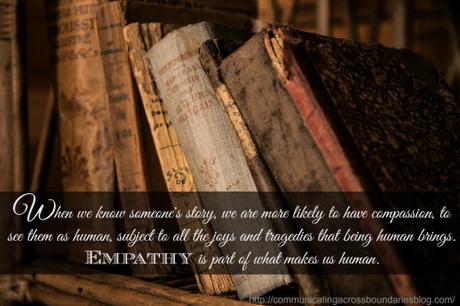
“Could a greater miracle take place than for us to look through each other’s eyes for an instant?” Henry David Thoreau
This is the quote that begins a marketing video developed for the Cleveland Clinic. It’s a video they call “Empathy: The Human Connection to Patient Care.”
It is a well done short film that shows us many different patients in the health care system, superimposing their stories in script beside their images. At heart it’s about seeing beyond the surface, understanding the story behind the person.
When we know someone’s story, we are more likely to have compassion, to see them as human, subject to all the joys and tragedies that being human brings. Empathy is part of what makes us human.
So how do we take this idea of seeing beyond the surface and begin to increase the collective empathy/emotional quotient or EQ in this country?
How can we teach kids to step into the shoes of others? How do we develop an understanding – an emotional connection to their circumstances. How can we teach adults how to enter the story of another – without judgment, without expectation, just listening and learning about the experience of another?
A couple of weeks ago I posted a short video of a little girl in Iraq named Myriam. At the end of the video, the videographer thanks Myriam for her story, for her perspective. She responds by saying “And I thank you.” He asks her why, what has he done for her. “You have felt for me,” she says. “I had a lot of things to say and you let me say them.” These words from a child are remarkable. As young as she is, she recognizes the importance of story, of allowing people into our stories. She recognizes the importance of empathy and thanks the person who is interviewing her for his empathy.
In a short film about empathy versus sympathy Brene Brown talks about the research of nursing scholar Theresa Wiseman. Dr. Wiseman researched empathy in different occupations and came up with these four characteristics of empathy.
1. Perspective – the ability to take the perspective of another, recognizing it as their truth.
2. Staying out of judgment.
3. Recognizing emotion in other people.
4. Ability to communicate that emotion with people.
Brene Brown goes on to say that empathy is a choice and that it is a vulnerable choice. To be willing to be empathetic we have to be vulnerable and find in ourselves something that connects us to the pain, the circumstances of another. That is not easy.
Perhaps that’s why we saw such a dearth of empathy on the deaths of two black men in recent months – those of Michael Brown and Eric Garner. Because no matter what you think or don’t think about the justice of each case, there is a place for deep empathy. Empathy with parents who have lost a child, with a woman who has lost a husband, with children who have lost their father. It seems many of us are unable to connect these tragedies with something inside ourselves, inside our souls.
Is it the same dearth of empathy that allows for rudeness and incivility in comments written at the end of online articles? The same lack of empathy that allows people to be unmoved when they see someone crying on the street? The same absence of empathy that has made bullying in and out of schools such a massive societal problem?
Or is it more complicated? Is it also because, as Leslie Jamison says, empathy is perched “precariously between gift and invasion?” Perhaps we struggle to voice empathy because we feel the person may not want us to ask questions, may not want us to connect at the heart level.
I think it’s partly about seeing people as less than as opposed to equal to. If we can see people as “less than” it is easy to dismiss them and dismiss their experience, dismiss their pain. If we acknowledge their humanity it becomes far harder to treat them poorly.
I don’t know what the answer is to developing an emotional quotient. I am a bleeding heart and can end up paralyzed by the pain of others and that’s not true empathy either. That’s being a trauma thief. But I think the process begins with watching, listening, and then being able to connect back to something in our own lives, remembering when we experienced something similar.
And then we ask. We ask them more about their story, more about their feelings, we learn the event behind the feeling. We think about how we might feel in the same situation. We let people tell their story, without judgment or fear of repercussions. Only then can we begin to see beyond our reactions into the heart of the person who hurts. Only then can we raise our emotional quotient and offer compassion and love.
What do you think? Do you think we have an empathy problem? What do you think would help? How do you teach your children empathy?
I wish empathy was less ‘walk a mile in another’s shoes’ & more of ‘believe the experiences of those who walk in shoes different from yours.’
*quote from Twitter

